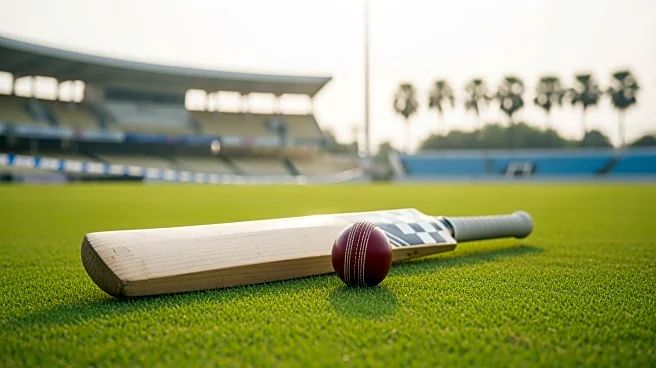What's Happening?
The Afghanistan Cricket Board (ACB) has announced the withdrawal of its national team from the upcoming Twenty20 tri-series in Pakistan. This decision follows the deaths of three Afghan cricketers, reportedly due to military strikes by Pakistan in the southeastern
Paktika province. The cricketers were allegedly targeted during a gathering in Urgun district after playing a friendly match in Sharana, the provincial capital. The ACB identified the deceased players as Kabeer Agha Argon, Sibghatullah Zirok, and Haroon. The incident has sparked significant outrage, with thousands attending the funeral prayers in Paktika, where condemnations were broadcasted via loudspeakers. The tri-series, which was set to include Pakistan, Afghanistan, and Sri Lanka, was scheduled for November 17-29 in Rawalpindi and Lahore.
Why It's Important?
The withdrawal of Afghanistan from the tri-series highlights the escalating tensions between Afghanistan and Pakistan, particularly following the Taliban's return to power in Afghanistan in 2021. This development is significant for the sports community, as it disrupts preparations for the T20 World Cup scheduled for next year in India and Sri Lanka. The decision by the ACB, supported by Afghan captain Rashid Khan and the Afghanistan Sports Journalists Federation, underscores the impact of geopolitical conflicts on international sports events. The federation condemned the military strike as a violation of international laws, reflecting broader concerns about regional stability and the safety of athletes.
What's Next?
The withdrawal may lead to diplomatic discussions between Afghanistan and Pakistan, as both countries navigate the implications of this incident on their bilateral relations. The tri-series was intended to serve as a preparatory event for the T20 World Cup, and its cancellation could affect the participating teams' readiness. Stakeholders in the cricketing world may seek alternative arrangements to ensure competitive preparation for the World Cup. Additionally, international sports bodies might address the safety concerns raised by such incidents, potentially influencing future event planning and security protocols.
Beyond the Headlines
This incident raises ethical questions about the intersection of sports and politics, particularly in regions affected by conflict. The decision by the ACB reflects a broader trend where sports organizations take a stand on political and humanitarian issues. The situation also highlights the vulnerability of athletes in conflict zones, prompting discussions on the role of sports in promoting peace and diplomacy. Long-term, this could lead to increased advocacy for the protection of athletes and the use of sports as a platform for conflict resolution.
















